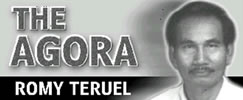VOLUME XXVII No. 50 |
Tagbilaran City, Bohol, Philippines |
June 23, 2013 issue |
advertisement |
| - |
| - |
ARCHIVED ISSUES |
 |
 |
Incoherence in the fight against illegal drugs |
|
Incoherence in the fight against illegal drugs Many worst crimes committed against society have been traced to the use and effect of illegal or dangerous drugs or substances. Rape and murder are just some of them. Killings and injuries resulting from road crashes (as distinguished from accidents) are also some of them. (According to the road sector agencies crashes can be avoided but accidents cannot). Daily news broadcast and print are filled with such report that alarm the people no end. Logically therefore suppressing the use and pushing of illegal and dangerous drugs should be in the priority of government through its law enforcement agencies. In fact it is. That is why we have laws like the R.A. 9165 otherwise known as the Comprehensive Dangerous Drugs Act of 2002. If the problem is just considered an ordinary or common crime, the task of suppressing it could have been delegated to the Philippine National Police (PNP). But no, the problem has tremendous damage to society and thus Section 82 of R.A. 9165 created the Philippine Drug Enforcement Agency (PDEA) as the implementing agency in carrying out the provisions of the R.A. 9165. Specifically in Section 84 (k), PDEA is mandated to “initiate and undertake the formation of a nationwide organization which shall coordinate and supervise all activities against drug abuse in every province, city, municipality and barangay with the active and direct participation of all such local government units and nongovernmental organizations, including the citizenry, subject to the provisions of previously formulated programs of action against dangerous drugs;” Moreover, Section 86. Of the same law mandates the transfer, absorption, and integration of all operating units on illegal drugs into the PDEA. Thus “The Narcotics Group of the PNP, the Narcotics Division of the NBI and the Customs Narcotics Interdiction Unit are hereby abolished; however they shall continue with the performance of their task as detail service with the PDEA, subject to screening, until such time that the organizational structure of the Agency is fully operational and the number of graduates of the PDEA Academy is sufficient to do the task themselves: Provided, That such personnel who are affected shall have the option of either being integrated into the PDEA or remain with their original mother agencies and shall, thereafter, be immediately reassigned to other units therein by the head of such agencies. Such personnel who are transferred, absorbed and integrated in the PDEA shall be extended appointments to positions similar in rank, salary, and other emoluments and privileges granted to their respective positions in their original mother agencies.” Given the difficult task, the law has amply provided for the organization of PDEA to carry out its tasks. In the meeting of the Provincial Peace and Order Council (PPOC) last Friday, however, the same problem of lack of personnel that hounded PDEA since its creation has remained up to the present. And so lack of personnel has always been the convenient reason that is given every time the question is asked why the problem of illegal drugs is growing. In that PPOC meeting it was revealed that the 10th largest island of the country with a population close to 1.3 million has only three (3) PDEA personnel with one on maternity leave. How can three personnel effectively and efficiently “coordinate and supervise all activities against drug abuse in every province, city, municipality and barangay…” when at the provincial level there are only three (3) personnel and none at the city, municipality or barangay? Even with the cooperation and active participation of all, it will still be a job even the “Man of Steel” will think twice before accepting. How is it that PDEA has not addressed the lack of personnel for ten (10) years knowing that it is a problem that stands between them and their successful pursuit of their mission? There is some incoherence here that is difficult to understand. Surely it cannot be lack of funding for they can always justify it before Congress to give them the money that they need. Surely it cannot be the lack of qualified and competent personnel that they can hire and deploy down to the barangay level. This is a situation that makes people speculate if not suspect why drug lords are laughing on their way to the bank. Or why conviction rate on illegal drug-related cases that have been few has been almost nil. PDEA has the key to all activities and operations against illegal drug pushers and lords. No law enforcement unit, not even the PNP, can undertake it without the knowledge, and sometimes approval, of PDEA. My professor at the National Defense College of the Philippines used to tell us that “Power corrupts, and absolute power corrupts absolutely.” In the case of the program of government to address dangerous and illegal drug activities, who has the absolute power? There are more questions on the problem of illegal drugs that the people don’t dare ask. |
| - |
| - |
The Bohol Sunday Post, copyright 2006 - 2013, All Rights Reserved |
For comments & sugestions please email: webmaster@discoverbohol.com |



